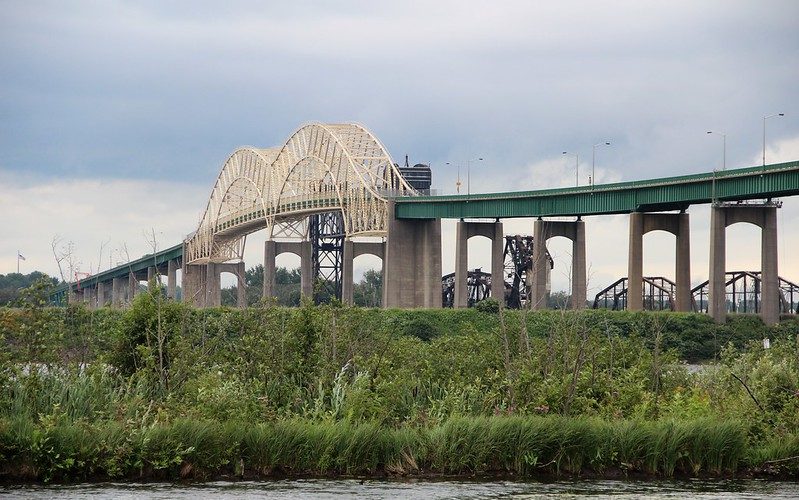President Trump, Canada and the Upper Peninsula

Michigan is home to some of the busiest border crossings between Canada and the United States. In 2024, over 1 million people traveled across the Sault Ste Marie International Bridge that connects Sault Ste Marie, Ontario and Sault Ste Marie, Michigan.
This represents a gradual recovery from 2020-2022, when Covid travel restrictions between the two countries were implemented.
Yet, the early months of 2025 have seen fewer Canadians electing to come to the United States. This article examines some of the causes behind the reduction in travel and considers its implications for border communities in the Upper Peninsula.
President Trump and Canada
In November 2024, president-elect Trump met Canada’s prime minister whom he later referred to as “Governor Justin Trudeau of the Great State of Canada.”
For Canadians, this statement marked the beginning of an uncertain and tense relationship with their neighbor. In January 2025, Trump stated that he would use “economic force” to acquire Canada, and told Canada’s Prime Minister that he wants to revise the boundary between the two nations that was set by a 1908 border treaty.
In March, he noted, “Canada only works as a state,” adding “We don’t need anything they have. As a state, it would be one of the great states anywhere.”
These and other statements that threaten Canadian sovereignty have led to a reconsideration of the country’s relationship with the United States. Indeed, the dominant issue in Canada’s most recent federal election was which political party might best handle President Trump’s attempts to annex the country.
Last month, the new Canadian government invited King Charles III to open the current session of Parliament, as a reminder that Canada is a constitutional monarchy with Charles as its formal Head of State.
The Border
Most Canadians live within 100 miles of the U.S. border and not surprisingly, they are the largest source of international visitors to the U.S. with 20.4 million visits in 2024.
Beginning this year, there have been well-publicized reports of non-U.S. citizens being stopped at U.S. border crossings and held for weeks at immigration detention facilities before being allowed to return home at their own expense.
The Canadian government warns its citizens that U.S. border agents don’t need to provide a reason when requesting a password to open phones, computers or tablets. The Canadian Association of University Teachers cautioned its members that those who have expressed negative views about the Trump administration should be particularly wary about crossing the border.
In March 2025, Canada along with a number of European countries issued travel advisories for citizens traveling to the U.S., noting that if the gender listed on an applicant’s passport does not match their gender assigned at birth, their travel permit or visa application can be denied.
These and other measures have had a chilling effect with the number of international visitors to the United States declining in the early months of 2025 compared to 2024.
Canadian Reactions
For most Canadians, President Trump’s statements and border policies represent a betrayal from a long-term friend. They have responded by reducing travel to the U.S and boycotting American goods.
A “Buy Canadian” movement was launched in February 2025 supported by supermarkets labeling products “Made in Canada,” while provincial governments pulled American liquor products from store shelves.
In the province of Quebec, Tesla vehicle sales dropped 90 percent from the previous quarter within the first three months of 2025. Statistics Canada reported that the number of passengers at Canadian airports screened to travel to the U.S. steadily declined between February and April 2025, while traffic increased for domestic and non-U.S. destinations.
The number of Canadians crossing by land into the US over the same three-month period was 5.1 million; a 19 percent drop from the equivalent period in 2024. A month-to-month comparison shows that there were 300,000 fewer cross border trips in February 2025 than in the previous year; the corresponding gap for the month of April is 500,000 which suggests that travel advisories have impacted cross border travel.
Fewer Canadians entering the U.S. has prompted numerous news stories about what this means for border communities. The BBC published an article about the impact of reduced border crossings on the Blue Water Bridge between Sarnia, Ontario and Port Huron, Michigan.
Similar news stories have been published about border communities in Washington, New York and Maine. They all conclude that reduced traffic from Canada is hurting local businesses.
Impact on the Upper Peninsula
Though Canadians make up a relatively small proportion of Michigan visitors, state tourism officials are expecting a dip in business this upcoming summer.
Mackinac Island’s Executive Director of Tourism is quoted in a Bridge Michigan article anticipating a “possible shift” in Canadian sentiment on travel to the island this summer. The other U.P. destination likely to be adversely affected is Sault Ste Marie. Tourism is a key component for both Mackinac and Chippewa counties, with tourists spending close to half a billion dollars in 2023.
The number of travelers crossing the International Bridge at Sault Ste Marie is down by 22 percent in the first four months of this year (Table 1). Not surprisingly, traffic on the Mackinac Bridge has also dropped, with fewer Canadians traveling south on Interstate 75.
Unemployment rates in Mackinac and Chippewa counties are already running ahead of 2024 levels (Tables 2 & 3) and unless Canadian visitors are replaced by others, it’s likely that tourism-related businesses will hire fewer summer workers.
Conclusions
President Trump’s comments about annexing Canada, alongside his administration’s border policies have led to a change in Canadian purchasing habits and travel plans, resulting in real world consequences for border communities.
Whether the decline in Canadian visitors to the U.S. is a short-term blip or it represents a new reality in the relationship between the two countries remains to be determined.
Whatever the outcome, it serves as a reminder of the interdependence between the two countries and the importance of being good neighbors.










Over half of the article is orange man bad, and then really light on data. This is lower quality than I expect from RI.
What other data would you like to see, Andre? I found plenty of data showing that the bridge is seeing fewer crossings, and Chippewa and Mackinac Counties have higher unemployment this year than last. These figures, of course, do not represent causation, as that would require much more time and research, at a time when human resources for such work are declining. However, it is unprecedented in the last century to have the U.S. president be so antagonistic to allies. “Orange Man Bad” is a simplistic view. I’d like to see more nuance in the comments section.
Amen
MAD MAN ACROSS THE WATER was just a song. MAD MAN RUINING BORDER RELATIONS is an undeniable point and the ‘data’ is telling. Why do we want Canada (and the rest of the world) to view the United States as a player in a hostile take over drama? Sad, sad, sad. Ken
Another excellent article. Thanks for sharing your thoughts on this subject.
Very interesting article.. I have lived in Minnesota, Michigan and New York – Canadians were always respectful and law abiding tourists that brought a lot of money into the border states.
Also I lived in Florida for 35 years, big drop in Canadian tourism there as well.
Do we really need more data to understand that antagonizing one of our closest allies and neighbors is not a good idea? What image do we project when using threats, fear and intimidation to get results?
another article written by those who have expertise the subject – meatpacking and environmental studies? Yes more is required to be creditable. The article is completely silent on causation. note the quotes “possible shift” and “likely to have an adverse effect.” I’m afraid this is just another example of TDS.
Thank you as always for bringing it home. This is happening now and it affects all the UP and Northern Michigan, beyond those counties listed directly.
canada has been living under the blanket of american military might forever… the new “leader” in canada is a socialist… like a spoiled child they don’t want to hear from the adults in the room
There is zero in this article that is a surprise and if it was, please get up to date on current administration economic strategies. The USA has totally alienated.one of our best trading partners. With these current strategies we can expect trade between our two countries to suffer. The cost of food, oil, vehicles, will increase along with unemployment and Michigan electric bills. Tourism is the key economic driver for the UP, when we insult and injure prospective guests, our revenues will drop. With hope, am still trying to find the benefit for Citizens from the ever changing tariffs and economic strategies putting in place by our administration.
A big hooray for meat packers and environmental studies.
First nice jab at hard working people that you would never consider working half as hard as thy do.
As you look down that long lengthy nose of yours “Upon Them”
While you sit in your safe spaces on clean water and pristine lands feeding your over fed big ass that Jumbo burger you so love.
Remember it’s the dirty folk that feed you “Porkie”
And it’s because of the causation of having to feed your bloated frame that you can complain about these low life’s, who support by your ever bloated waist line and EGO.
Back to the buffet with you!
As usual a great article focusing the Upper Peninsula and in this case its entry into national/international affairs. We tend to forget that Canada is a close neighbor and ally. Thank you.